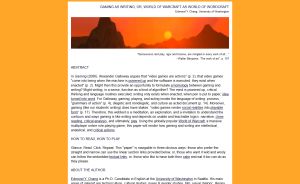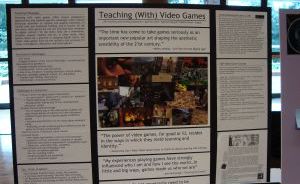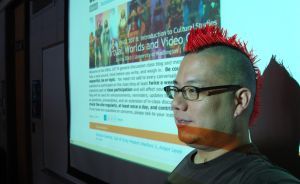

 I have taught at the college level for nearly fifteen years, teaching classes ranging from composition to college preparation to introductory literature courses to special topic courses on video games, Harry Potter, cyberspace, and live-action role-playing games. My courses invite and incorporate continuing discussions about academics, current events, lived experience, politics, popular culture, and increasingly, technology. No matter the topic at hand, I believe it is important for my classroom and for my students to be mindful of the world around them, particularly in the ways they use, naturalize, even take for granted digital media, communication technology, and computers.
I have taught at the college level for nearly fifteen years, teaching classes ranging from composition to college preparation to introductory literature courses to special topic courses on video games, Harry Potter, cyberspace, and live-action role-playing games. My courses invite and incorporate continuing discussions about academics, current events, lived experience, politics, popular culture, and increasingly, technology. No matter the topic at hand, I believe it is important for my classroom and for my students to be mindful of the world around them, particularly in the ways they use, naturalize, even take for granted digital media, communication technology, and computers.
Given recent new media research and digital humanities initiatives by organizations like the MacArthur Foundation, the Gates Foundation, and Microsoft and the Science, Technology, Engineering, and Mathematics (STEM) Education Coalition coming out of the US Department of Education and National Science Foundation, the focus on how technology is used and integrated into teaching and learning has raised many possibilities and even more questions. At the core of the fervor is a desire for educational reform and innovation that ostensibly capitalizes on our technologically-imbricated society, that attempts to meet students “where they are” in terms of their facility with and affinity for certain technologies. Even though I am a scholar of technology and digital media, even though I regularly employ technology in my classes, and even though I believe in the radical potential of technology, I am wary of the assumptions that underlie Mark Prensky’s notion of the “digital native” and “digital immigrant” (terms that already belie a certain techno-orientalism) or The Partnership for 21st Century Skills’s push to “fuse the 3Rs and 4Cs (Critical thinking and problem solving, Communication, Collaboration, and Creativity and innovation)” or the recent eagerness over gamification.
That being said, I believe that teaching with technology and teaching technology must begin with developing critical approaches, different kinds of “literacy,” and integrations and implementations that do not simply drop technology into a course for technology’s sake. For example, I have taught computer-integrated classes where instruction is divided between a traditional seminar room and a computer lab. My classes all have course websites and message boards where students can access assignments, readings on electronic reserve, and participate in online discussion. I also make myself available via instant messenger, with careful guidelines, for virtual office hours, which many students have found convenient and helpful. Again, it is important that the technology I do use is framed well, integrated into the curriculum, and responsive to the class’s needs. It is also important to consider access, students’ proficiency, and whether or not a particular technology replaces or augments some other mechanism or material.
Moreover, both teachers and students need to recognize that technology does not begin with the screen or the smart phone or the twenty-first century. Rather, how might we develop multi- and trans-technological approaches, what Jay David Bolter and Richard Grusin call remediation? I believe it is important that students understand that they kind of time and energy and focus they put into maintaining their Facebook presence or playing a video game is analogous to the kinds of skills and attention needed to read a novel, write a paper or report, or study for an exam. For example, I discuss at length the role of research online and the benefits and pitfalls of Google, Wikipedia, and research databases like Academic Search Complete or the MLA International Bibliography. It is important that students understand that the technology might make finding “stuff” faster, but it does not replace close reading, careful annotation, bibliography, and critical thinking.
Finally, in line with developing new “literacies,” I think that we must think about technology and the cultures around technology as objects of analysis and study. In other words, technology is more than just a neutral tool or apparatus. Rather, technology involves and reveals all sorts of norms, values, practices, and assumptions that can be unpacked to help us think about our relationship to technology. For example, in my classes about video games, I challenge students to think not only about content, narrative, or mechanics but to try to understand the complex relationship between medium and message, story and algorithm, between game and the culture at large. It is far too easy to instrumentalize a video game as only programming or to dismiss a game as simply fun–both rationales defend against “reading too much into” games. Therefore, I have worked on the idea of “close playing” (akin to close reading) as a metacognitive and critical approach to gaming. In fact, I have written about this very thing in an article for Computers and Composition Online special issue on “Reading Games: Composition, Literacy, and Video Gaming” (August/September 2008) entitled “Gaming as Writing, Or, World of Warcraft as World of Wordcraft.”
Overall, I am excited by the possibilities. I am very interested in thinking about ways to teach and teach with social networking media, cloud computing, virtual worlds, and games. But I believe that the technology itself is only a portion of the solution. All in all, a twenty-first century education is about practicing and developing all of the necessary skills for work, play, and life with or in spite of technology.
For more details on how I teach (with) technology, see the following:
- Critical Gaming Courses
- “Mediating Identities: Technologies of the Self,” CHID 480: Special Topics in Comparative History of Ideas, Spring 2012.
- “Imagining Cyberspace,” ENGL 111: Composition with Literature, Autumn 2006.
- “Everyday Media: Reading, Writing, and Critiquing,” ENGL 111: Composition with Literature, Winter 2006.
- Teaching Symposia
- Research Exposed!
- Teaching Portfolio
For other sections of my portfolio, go to:
- Dissertation
- Keywords Project
- HASTAC Scholars
- Critical Gaming
- Awards
- Websites
- MA Thesis
- Portfolio Overview